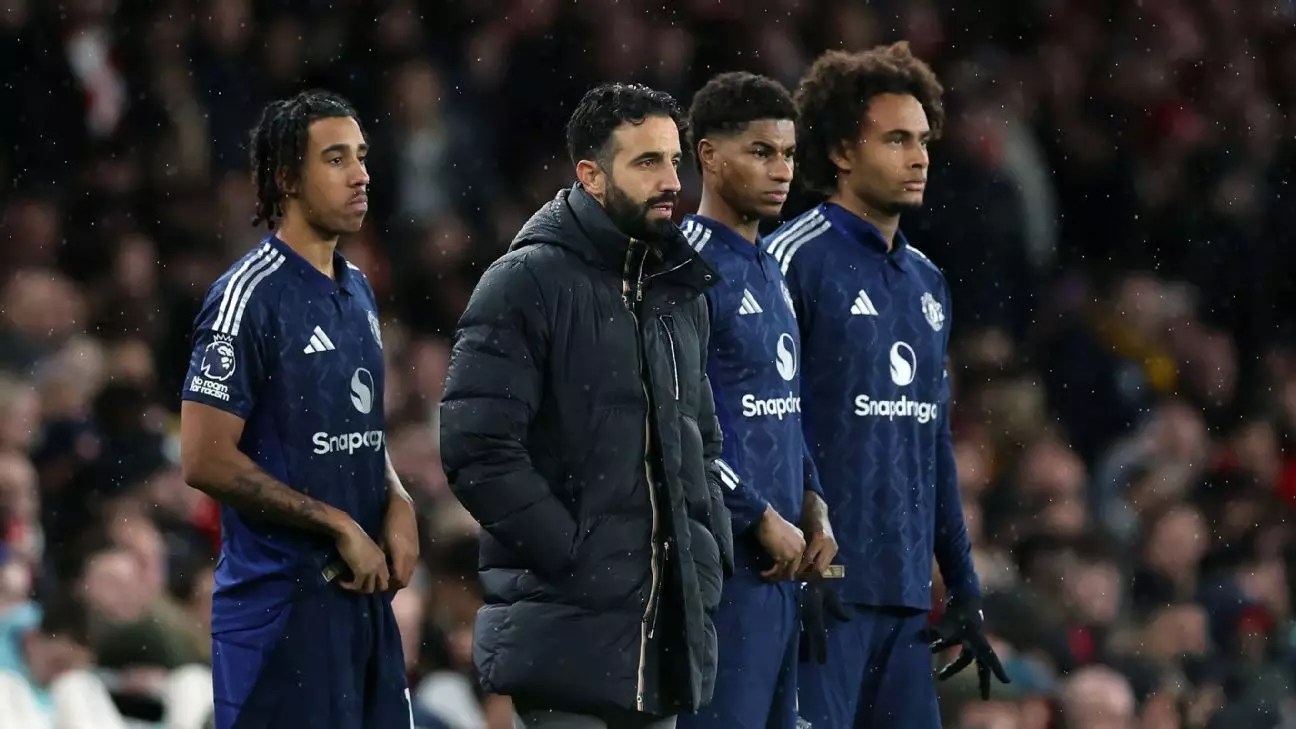Ruben Amorim’s tenure at Manchester United has begun with notable challenges, specifically in managing player injuries that hinder squad performance. This was starkly evident during his first league defeat as United’s manager, a 2-0 loss to Arsenal. The match highlighted significant issues within the team, particularly the ongoing struggle with player fitness and the tactical adjustments required to address these limitations.
Amorim, who previously found success at Sporting CP, indicated that his coaching decisions are being dictated by the condition of his players. The complexity of the situation is exacerbated by the fact that critical squad members, including Harry Maguire, Tyrell Malacia, and Mason Mount, are returning from injuries. In the match against Arsenal, these players were limited to playing less than an hour each, which effectively restricted Amorim’s tactical flexibility during this crucial encounter. The introduction of Leny Yoro, who was making his first appearance following a long foot injury layoff, showcased the depth of the dilemma, as the manager has had to balance competitive demands with the health of his players.
Amorim communicated his struggle to maintain squad fitness and readiness, stating, “So for example, Harry Maguire has a time limit, Tyrell Malacia has a time limit, Mason Mount has a time limit, Leny Yoro has a real time limit.” Such constraints force him to adopt a cautious approach, managing the workload of these players to avert exacerbating their injuries. This situation creates a tactical conundrum: how to enforce a vigorous playing style while protecting fragile players.
Despite the loss, Amorim expressed his commitment to finding positives within his team’s performance. He emphasized that evaluations should extend beyond the final scoreline, highlighting the tangible moments where his squad showed resilience or tactical awareness. “You can feel it in the stadium, especially in the end of the first half you can feel they were not comfortable,” he noted. Such observations suggest that while results are vital, developing a deeper understanding of his team’s psyche and performance under pressure is equally important for Amorim as he navigates his early managerial challenges.
These reflective moments after the match are crucial for Amorim. He recognizes the fluctuations of momentum during games, admitting, “You see a goal, and then the momentum changes, and it’s really hard for us to take full control of the game.” This acknowledgment of psychological factors could help him formulate strategies to bolster confidence and resilience, enabling his players to handle high-pressure situations more effectively in the future.
In addition to managing immediate game-time pressures, Amorim has to consider the long-term rehabilitation of players like Luke Shaw, who recently faced another setback after previously struggling with a lengthy calf injury. Amorim’s support for Shaw reflects a broader philosophy of patience in player recovery, underscoring the importance of mental fortitude alongside physical readiness. “What I can say since I arrived, I see him in the medical department working a lot in the gym,” Amorim stated, underscoring his recognition of Shaw’s dedication during rehabilitation.
This nurturing approach offers a refreshing perspective on coaching, focusing not just on results but on the welfare of players. Amorim seems committed to providing Shaw with the timeframe necessary for full recovery, emphasizing that “no matter how long he will need, I will be with him.” This indicates a level of understanding that developing a cohesive and healthy squad extends beyond the immediate needs of winning matches.
As Ruben Amorim embarks on his managerial journey at Manchester United, he faces a complex landscape defined by injury challenges and squad management. His early experiences, particularly the recent defeat at Arsenal, serve as critical learning opportunities that will shape his strategic approach moving forward. Balancing tactical aspirations with player welfare will be key as he aims to stabilize the team and return to winning ways. While the road ahead may be fraught with obstacles, Amorim’s focus on recovery, performance evaluation, and resilience may ultimately lead to a stronger United in the long term.


Leave a Reply